
CCR and CSCR co-organise webinar on breast cancer
Breast cancer is the most common form of cancer affecting women in Malaysia, as about one in 19 women in the nation are at risk according to the Breast Cancer Foundation. Besides, breast cancer is also the second leading cause of cancer deaths among women worldwide. However, it has been proven that early detection and getting appropriate medical attention could help to save one’s life from breast cancer.
In line with the CCR-CSCR International Webinar Series (Episode 12021), UTAR Centre for Cancer Research (CCR) and UTAR Centre for Stem Cell Research (CSCR) jointly organised a webinar, parked under CCR-CSCR International Webinar Series (Episode: 1/2021), via Zoom on 24 April 2021. Titled “Breast Cancer”, the webinar aimed to share knowledge on breast cancer stem cells as well as some information on the management of early breast cancer.
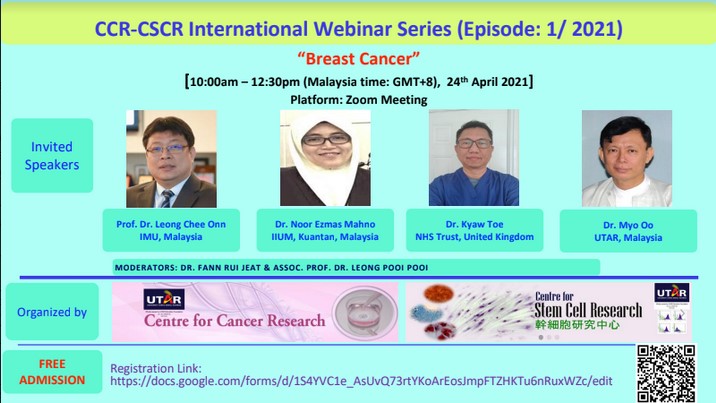
CCR and CSCR co-organised the webinar titled “Breast Cancer”
The invited speakers for the webinar were Prof Dr Leong Chee Onn from International Medical University (IMU) Malaysia, Dr Noor Ezmas Mahno from Universiti Islam Antarabangsa Malaysia (Kuantan Campus), Dr Kyaw Toe from National Health Service (NHS) Trust of the United Kingdom, and Clinical Assoc Prof Dr Myo Oo from UTAR Faculty of Medicine and Health Sciences (FMHS). The webinar was moderated by FMHS Deputy Dean for Student Development and Industrial Training Assoc Prof Dr Leong Pooi Pooi and FMHS Department of Medicine lecturer Dr Fann Rui Jeat.
The opening ceremony was graced by FMHS Department of Surgery Head Clinical Assoc Prof Dr Yan Naing Soe. He thanked the four speakers, organising committee, participants and said, “The webinar benefited participants from several aspects. Through the webinar, participants would learn some recent updates in breast cancer research from Malaysia and the United Kingdom centres as well as the recent updates in management and breast-conserving surgery among Malaysian and the United Kingdom patients. Besides, we also wanted to create a platform for intellectual exchange amongst clinicians, breast cancer researchers and medical students.”
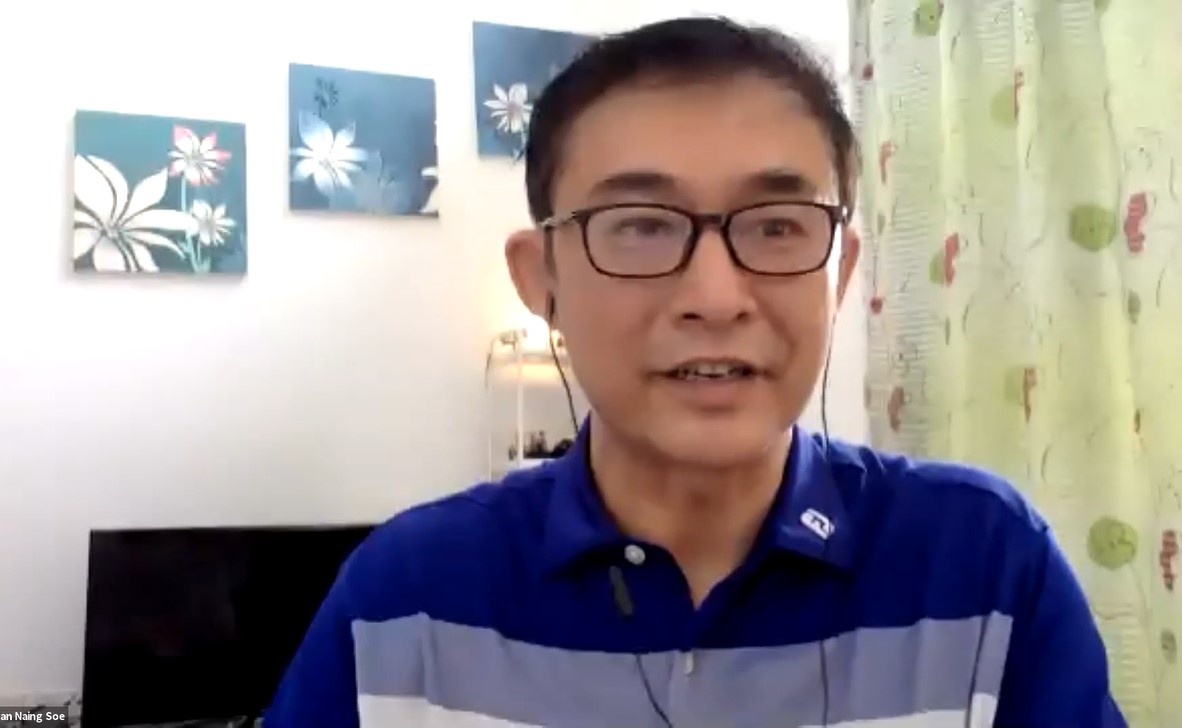
Dr Yan giving his opening speech
Dr Leong started his talk titled “Targeting breast cancer stem cells” by explaining the cancer stem cells (CSCs) and non-CSCs. According to Dr Leong, tumours are quite a heterogeneous disease. There are currently two models that explain this kind of phenomenon, namely the Stochastic Model and the Hierarchy Model. For the Stochastic Model, the tumours usually arrive through the mutation of any nucleated cell. The mutation usually could take place due to intrinsic factors or extrinsic factors. On the other hand, the Hierarchy Model, also known as the “Cancer Stem Cell model” suggests that not all the cells can actually form tumours. The growth and progression of many cancers are driven by small but distinctive subpopulations of CSCs; the tumours are a caricature of normal tissue development where stem cells maintain normal tissue hierarchies.
He explained, “Previous research studies on CSCs hypothesis suggest that if we could target the cancer stem cell, then the cancer will automatically regress. Although the cancer stem cells play an important role in relapse, the new research studies also showed that non-CSCs can also cause the relapse. To cure the cancer cells, we need the combination of specific and non-specific therapy.”
Throughout his talk, Dr Leong explained the application of Metformin, a kind of drug, in their research study on how it affects CSCs and non-CSCs. He said, “We found that Breast CSCs are sensitive to Metformin compared to other drugs like Doxorubicin, Paclitaxel, FEC, AICAR and A-769662. As a result, we found that Metformin synergises FEC (5-fluorouracil, epidoxorubicin and cyclophosphamide) sensitivity in non-stem breast cancer cells via AMPK-dependent mechanism. The FEC is a combination of three chemotherapy drugs, namely 5-fluorouracil, epidoxorubicin and cyclophosphamide which are used to treat breast cancer. The Metformin also impairs the ability of CSCs to repair FEC-induced DNA damage.”
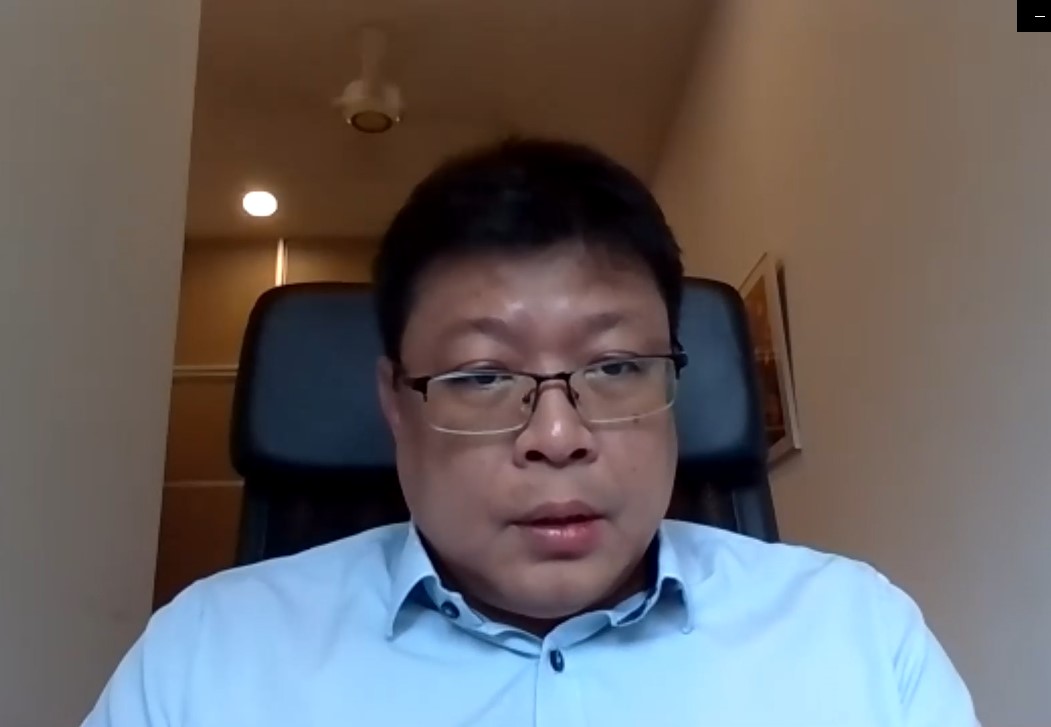
Dr Leong explaining the Stochastic Model and Hierarchy Model of breast cancer
Dr Noor shared the “Updates on Management of Early Breast Cancer”. While explaining the definition of early breast cancer, Dr Noor said, “We basically define the early breast cancer with Tis (Tumour in situ), T1 and T2 which refer to the size of the tumour. For T1, the tumour is less than two centimetres while for T2, it is less than five centimetres. After the screening, N0 states that cancer has not spread to nearby lymph nodes while N1 indicates that the imaging of cancer has spread to one to three axillary (underarm) lymph node(s), or tiny amounts of cancer are found in internal mammary lymph nodes on sentinel lymph node biopsy. MO also refers to the early stage of breast cancer as it means no distant cancer spread was found.”
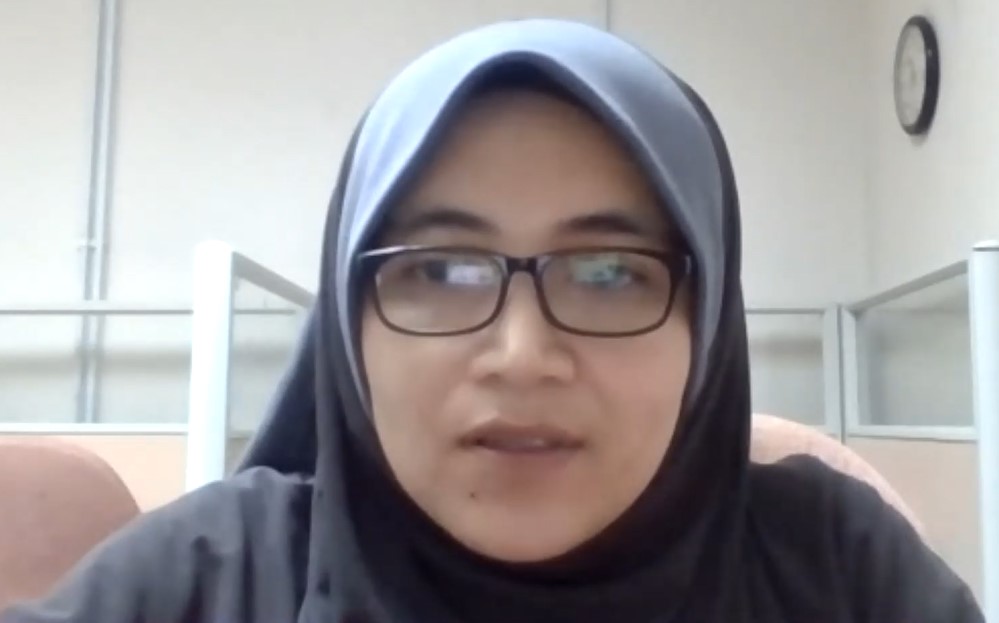
Dr Noor explaining the definition of “Early Breast Cancer”
In his talk titled “Principles of Breast Conserving Surgery”, Dr Kyaw provided insights on Breast Conservation Surgery. Speaking of why Breast Conservation Surgery is important, Dr Kyaw explained, "In the past, Halsted surgery and Radiotherapy caused physical disfigurement, lymphoedema and psychological trauma on women. Thus, women demand better treatment with an improvement of treatment outcome. Recently, the Breast Conservation Surgery has shown improvement in the treatment of breast cancer."
According to Dr Kyaw, Breast Conservation Surgery only removes the cancer lump and some breast tissue around the lump. The margin of the lump’s size will decide how much of the breast is removed. After the Breast Conservation Surgery, chemotherapy or radiotherapy will be given to the patients so the cancer cells which may have not been removed during the surgery could be destroyed. Dr Kyaw also gave several examples and instructions on how to do Breast Conservation Surgery.
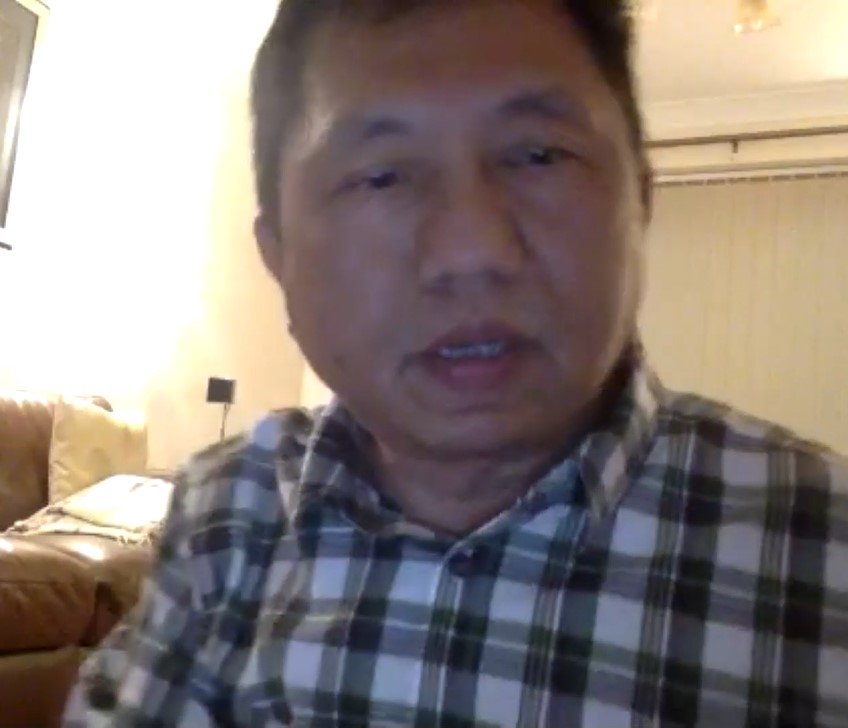
Dr Kyaw during his talk on Breast Conservation Surgery
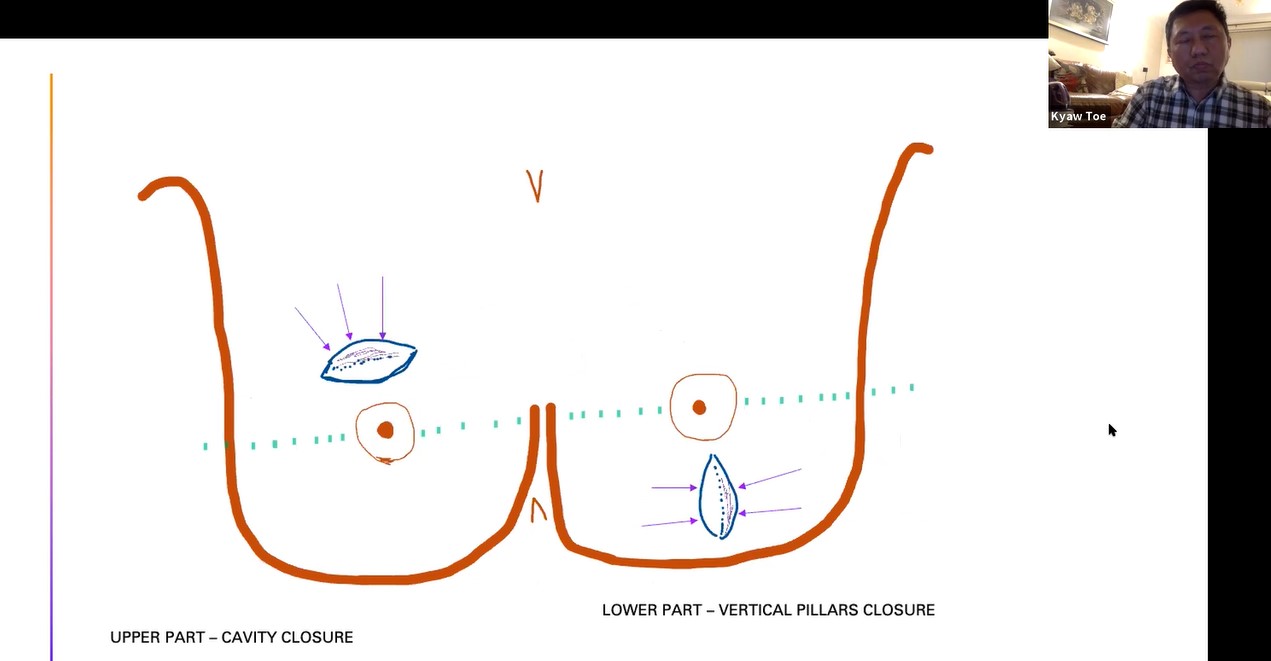
Dr Kyaw showing how Breast Conservation Surgery works
Dr Myo, as the last speaker, emphasised the need to implement research in breast cancer research. During his talk titled “Implementation Research and Breast Cancer”, he told the participants that only a few published evidences were translated into clinical practice. “You have probably heard about the 17 years lag for an evidence-based treatment to get established to its implementation in general clinical practice. Majority of the evidence-based practices were never applied into practice. The mean wait between innovation and application is 17 years and the implementation deficits contribute to excess research waste.”
He added, “Implementation research is the scientific study of the use of strategies to adopt and integrate evidence-based health interventions into clinical and community settings to improve individual outcomes and population health. In other words, the implementation addresses questions concerning implementation which is the act of carrying an intention into effect. Through implementation research, the health research can be made into policies, programmes, or individual practices (collectively called interventions).”
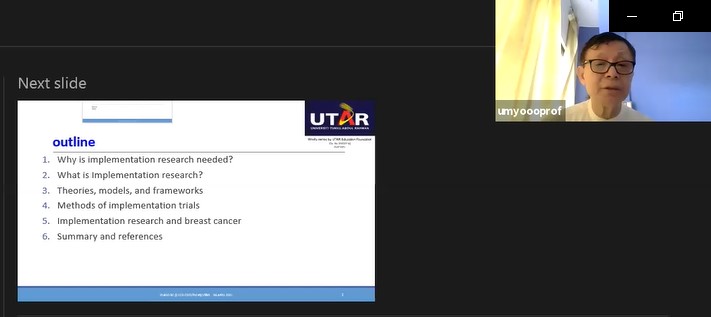
Dr Myo during his talk session on “Implementation Research and Breast Cancer”
The webinar concluded with a Q&A session and a closing speech given by FMHS Deputy Dean for R&D and Postgraduate Programmes Prof Dr Alan Ong Han Kiat, followed by a group photography session.
Prof Alan Ong said, “First of all I would like to congratulate the organising committees for successfully bringing all the experts together to educate us about breast cancer. I would also like to thank all the speakers for sharing their expertise and clinical experience on breast cancer. The sharing given by the speakers was indeed interesting and useful for clinical and medical research studies.”
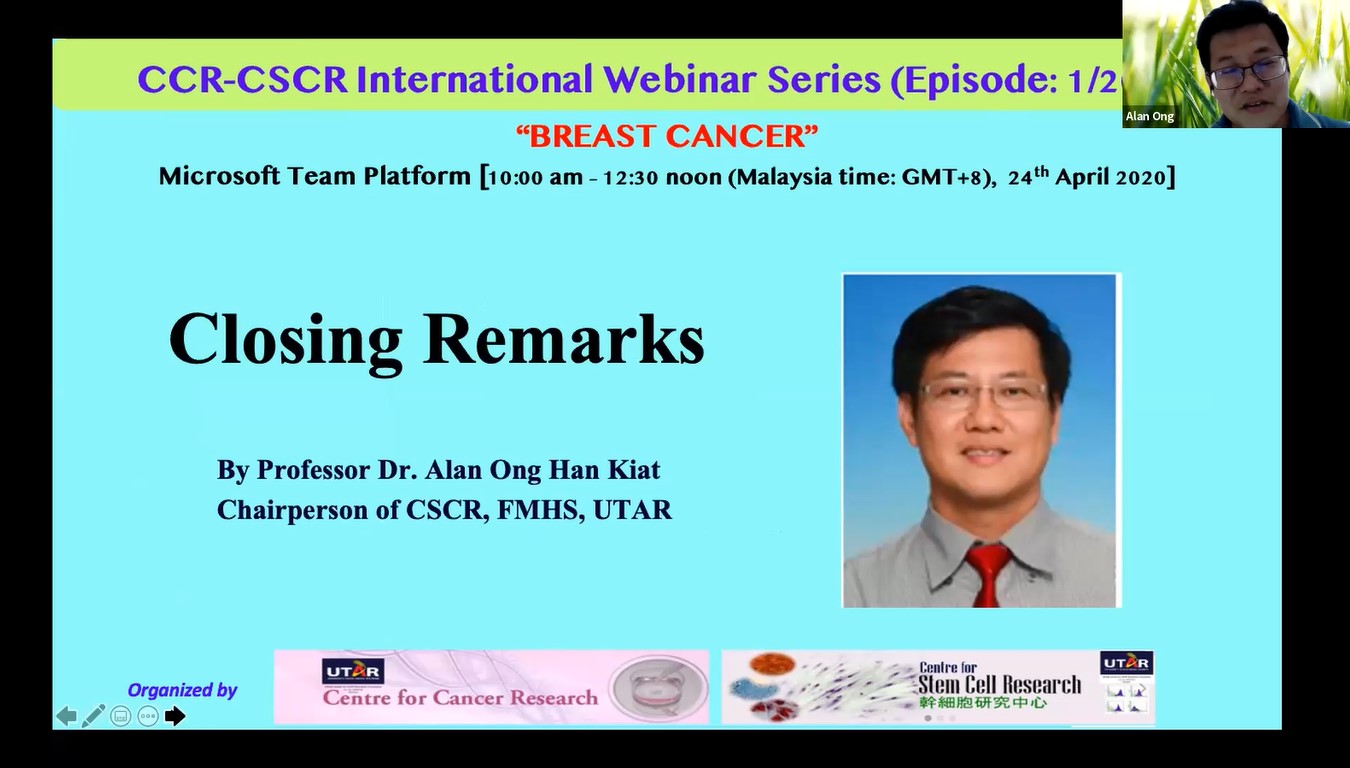
Prof Alan Ong giving the closing speech
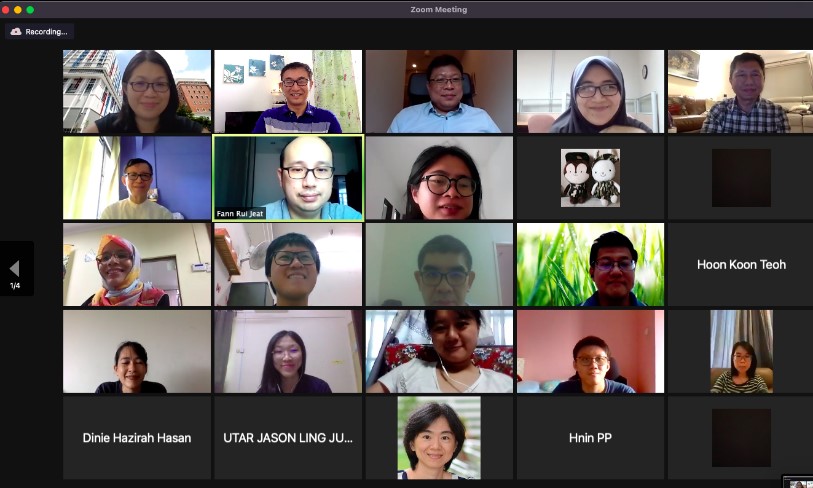
The speakers taking a group photo with the participants
© 2021 UNIVERSITI TUNKU ABDUL RAHMAN DU012(A).
Wholly owned by UTAR Education Foundation (200201010564(578227-M)) LEGAL STATEMENT TERM OF USAGE PRIVACY NOTICE